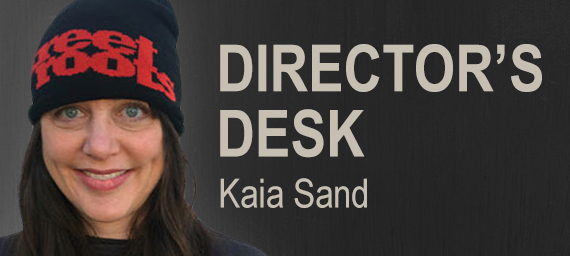Daniel Cox handed me a thick packet of paper from a notebook, folded in half.
Poems.
“I miss people,” he said softly.
I was inadequate to the moment, my attention fragmented as I eyed the maybe 100 people standing in line behind him — spaced, physically distanced so that the line stretched out of sight and around the corner. We were distributing the assistance money to Street Roots vendors because our print edition has been on hiatus since March.
It was later that I let the heartbreak of the moment sink in: Daniel, standing in line with so many people, but isolated. Masked, I was unable to smile at Daniel. Physically distanced, I couldn’t reach out and touch his hand. Harried over administrative concerns of Street Roots — such as getting enough money to continue this assistance (please do continue to think of us!) — I wasn’t present enough for him.
That evening, I settled into a chair, unfolded the packet and read a poem written on pale blue lines in green ink:
The flywheel flew off the handle
halting the world engine.
Everything came to a stop.
Soon widespread panic ensued.
One minute the balance was aligned
A second later the world as we knew it
did not exist any more.
In the aftermath those who survived
had to learn a new method to live.
I should probably mention how I much I admire Daniel’s poetry. I trimmed two of his poems from our newsprint and taped them to my computer. I met one Street Roots supporter for coffee for the sole purpose of discussing various Daniel Cox poems. For the previous two Octobers, Daniel, longtime Street Roots volunteer Josh Moss and I have convened for a bacon-and-eggs discussion of poetry and life, a tradition we’ve all vowed to continue as long as we can. Daniel told Josh and me a humorous account of how he became a poet. His mom, he said, would have him read the dictionary when he got in trouble.
“And I got in trouble a lot,” he said. “So, I read the whole dictionary.”
During one of these breakfasts, we relished words like “cleave” that have two meanings that are opposite of each other. Cleave — both to break apart and to bring together.
Right now, humanity, we are cleaved.
Global pandemic. Street uprisings that refuse to abide by the enduring violence of enslaving Africans to extract and expand wealth. This country’s violent origins beget violent contemporary responses. “Dying is the high cost of living,” Daniel writes:
Everyone Doing
You’re fooling yourselves to death!
Dying is the high cost of living nowadays.
But you’re bleeding everywhere.
Yes, but I’m young and bulletproof!
Apparently not, there’s blood
And it’s seeping into the carpet.
Hello, hello.
This is one of my all-time favorite final lines of a poem. “Hello” — well, that is a greeting. But the repetition of “Hello, hello”? There’s isolation, too. Can anyone hear him?
There’s the isolation of living in a pandemic. And there is the isolation of being very poor.
Daniel writes as a witness to poverty. Carolyn Forché, whose “Against Forgetting” catalogues 20th-century accounts of Poetry of Witness, describes that poets of witness are those “for whom the normative promises of the nation-state have failed. They have not been afforded the legal or the physical protections that the modern state is supposed to lend its citizens.”
Founded in white supremacy, accomplice to unrestrained private wealth, the United States has failed too many of its people — Black neighbors killed by state violence; poor neighbors surviving in tents draped with blue tarps like urban haystack rocks; the many, many more who are poor, indoors and out of public eyeshot, the droves of future unhoused neighbors when more evictions fall hard like an axe.
This is another Daniel Cox poem taped to my computer.
Last House on the Block
The bell was replaced by a speaker.
Vagrants sleep on the door steps.
The inside is beautiful, the outside is ancient.
They spare no expense, with all its adornments and gilded objects,
but we the poor keep being the poor.
I keep this poem in front me every day as motivation. That final line speaks to an inevitability that must be challenged. With small reforms as our only tools, “the poor keep being the poor.” More radical transformation is threatening to a country whose prosperity is based on violence.
There’s so much more to write about Daniel’s poetry. The observational, precise poems evoke for me the poetry of Greek socialist Yannis Ritsos, who was imprisoned for years for his opposition of fascism, and the mottos of Bertolt Brecht, as well as Brecht’s allegorical poems, when he took on the fascists of his time as Daniel does when he writes of the “kaleidoscope vision from insane megamaniac mind with super inflated ego that he wore quite well inside his tiny skull …” And there are Daniel’s meditative poems, like the one he read outside Street Roots during an early week of the pandemic in March.
But I’ll leave it at this:
Let Daniel know you miss him and his poetry. Do you have a favorite poem? Do you remember an image or a line from one you read before? Share this on social media. #DanielCoxPoetry. Make a comment on our social media.
And, if you aren’t a reader of Daniel’s poems, I hope you are determined to become one when our paper returns to the streets, in that “aftermath” when “those who survived … learn a new method to live.” Let it be an just aftermath of our making, cleaved from this cleaving.
VENDOR PROFILE: Daniel Cox: A poet in our midst
Director's Desk is written by Kaia Sand, the executive director of Street Roots. You can reach her at kaia@streetroots.org. Follow her on Twitter @mkaiasand.



